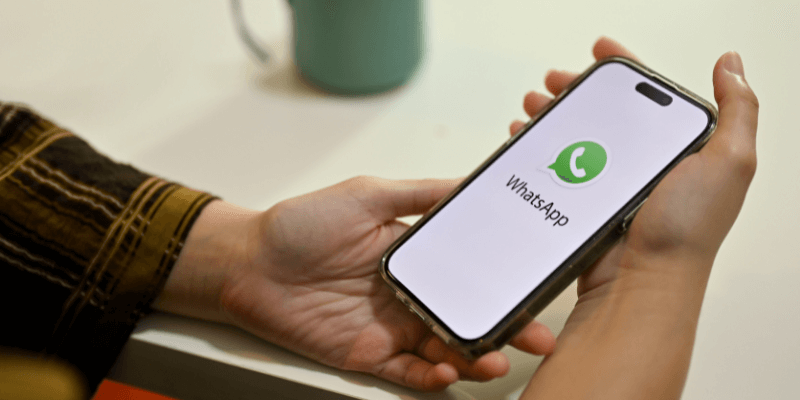The quick answer is:
Absolutely. Microsoft and Apple, both of whom spend at least a quarter of WhatsApp’s annual revenue just on security and make 300-400 times what WhatsApp does annually, have been hacked recently. Hackers are well-motivated to do so and stand to make millions by hacking large companies.

Hi, I’m Aaron. I’m an information security professional and have been working in the industry for the better part of two decades. My job is to mitigate cyberattacks (or hacks) and keep people’s data safe.
Let’s dig into why WhatsApp can be hacked and what you can do to minimize your risk.
Table of Contents
Key Takeaways
- WhatsApp isn’t immune from cyberattacks.
- You can be attacked using tried and true social engineering attack methods.
- Be aware of when someone’s trying to phish you on WhatsApp.
- You should also make sure you’re using unique and complex passwords.
- Finally, be judicious with what you download and use on your iOS or Android device.
Why WhatsApp Could Be Hacked?
WhatsApp is an incredibly popular calling and messaging app. It’s owned by Meta, the rebranded parent company that owns Facebook, Instagram, WhatsApp, Oculus, and many other tech companies.
That makes WhatsApp an alluring target. Meta is one of the largest companies in the world. Compromising one of their offerings would be a feather in the cap of any threat actor.
WhatsApp, specifically, is billed as a secure messaging and calling app. Depending on the part of the world the WhatsApp user lives in, that’s a real and persistent need. Revelations of who messaged what could impact lives and livelihoods.
Those kinds of revelations incentivize companies to pay ransoms not to reveal sensitive information. Many companies won’t pay to stop the release of sensitive data, but some will. The fewer organizations that pay, the less likely they’ll be hacked. After all, if it’s not cost-effective to hack companies, the volume of hacks will decrease.
Even more troubling, your WhatsApp could be hacked! If a hacker gains access to your phone or WhatsApp account, they can gain access to your WhatsApp messages. That’s far easier than you might think to accomplish and it’s leaps and bounds easier than trying to hack the WhatsApp platform itself.
While you can’t do anything if WhatsApp is hacked, you can prevent your instance of WhatsApp from being hacked.
How You Can Protect Yourself
There are some very effective ways for you to protect yourself and maintain the integrity of your WhatsApp account.
1. Be Phishing Aware
Phishing attacks are those where a hacker tries to steal your information through a message, email, phone call, or other communication. Typically the hacker will try to establish a trust relationship: they’re a friend of a friend, someone from work, someone from WhatsApp, or another source to whom you’d provide information.
The hacker will then ask for information–either personal information or your WhatsApp account information. They’ll also impose some deadline or otherwise try to convince you that sharing the information is urgent. That information will be used to access your account.
You can thwart phishing attacks by not providing your information. If someone is legitimately asking for your information, it’s not going to be urgent. You’ll be able to contact the individual via a publicly listed mode of communication or, in the case of a personal acquaintance, one that you know.
2. Practice Good Password Hygiene
If you use simple passwords, then those passwords can be guessed. Passwords like Password1! aren’t secure. If you use a password like that, you shouldn’t expect your account to be secure. Using longer and more difficult-to-guess passwords are encouraged to protect your data.
You should also refrain from reusing passwords. If you reuse passwords between more than one account and only one of those accounts is compromised, then hackers have the password for every other account sharing the same password.
3. Be Careful What You Consume
Malware can be hidden in files, including images, gifs, PDFs, and others. Some of that malware can be targeted at your iOS or Android device. If you download and launch it, that malware can scrape information from your accounts and even steal your passwords.
Only download what you know is legitimate. Beware of files from less than legitimate-sources.
4. Be Careful Which Apps You Download
Google and Apple have wonderfully curated app stores and do a great job at removing illegitimate apps. They’re not perfect, though.
Make sure the WhatsApp app that you’re using is legitimate and not a copy. A copy can steal your account credentials without you knowing.
FAQs
Here are some answers to common questions related to WhatsApp account hacks.
What are the Signs of WhatsApp Being Hacked?
Unusual activity is a big one. Do you see a number of conversations you don’t remember on your account? Has your password changed without your knowledge? If so, your WhatsApp account may have been hacked.
Can Someone Hack Your Bank Account Through WhatsApp?
You can be phished through WhatsApp and your bank information stolen. Someone can’t hack your bank account directly through WhatsApp. They can, however, hack you and steal your banking information.
Can Someone Hack My Phone by Texting Me on WhatsApp?
No. Someone cannot hack your phone just by texting you on WhatsApp. They need to do something else like enticing you to reveal information or download malware. Once they do that, they can hack you.
Conclusion
WhatsApp is an incredibly secure platform. That doesn’t mean that it’s immune from cyberattack. Even more important: you’re not immune from cyberattack. Social engineering attacks like phishing are incredibly successful and just by being human, you’re susceptible.
Understanding what to look for and how to keep yourself safe in our increasingly digital world is key to protecting your identity and information.
Has someone tried to hack you on WhatsApp? Let me know in the comments below!
